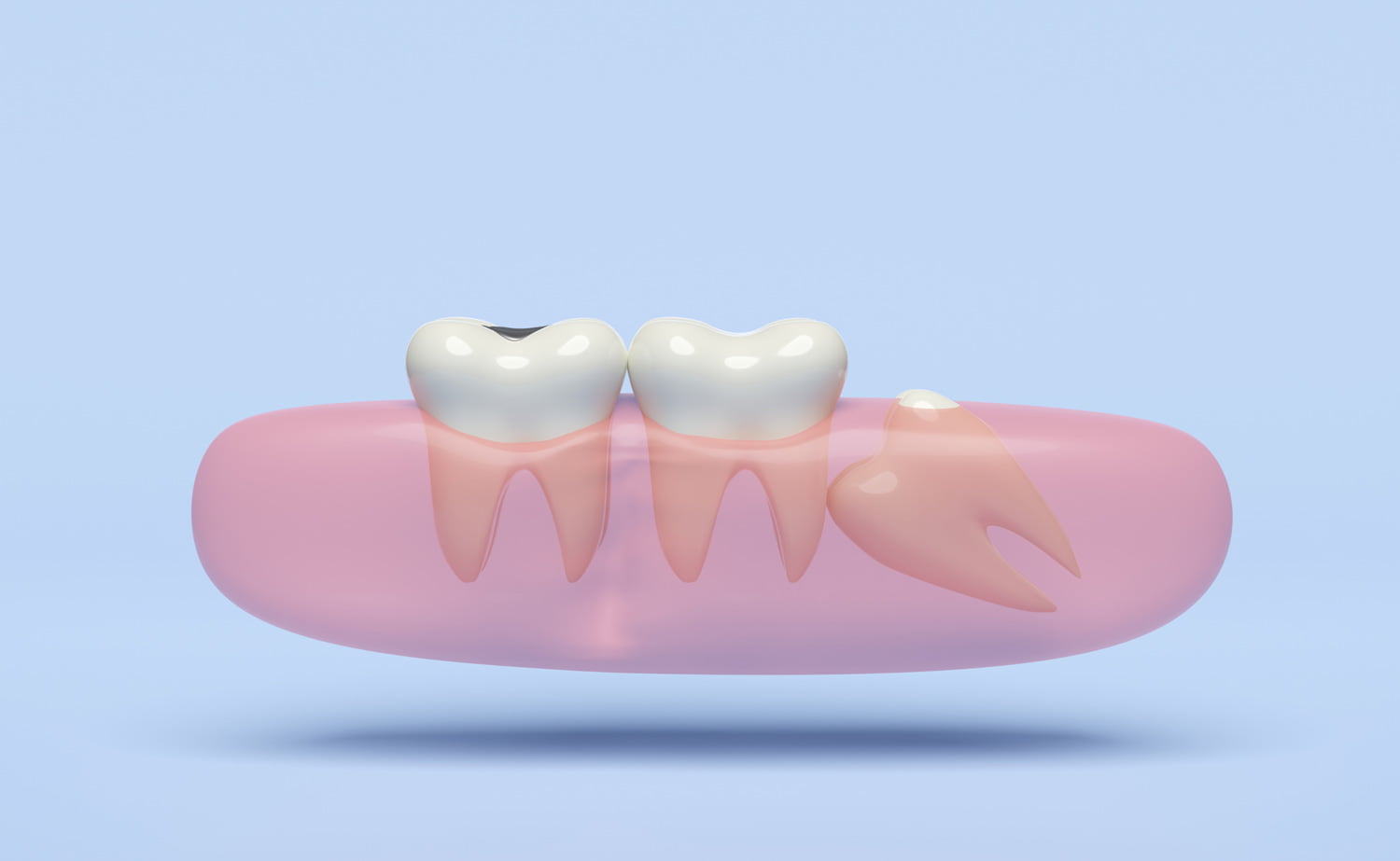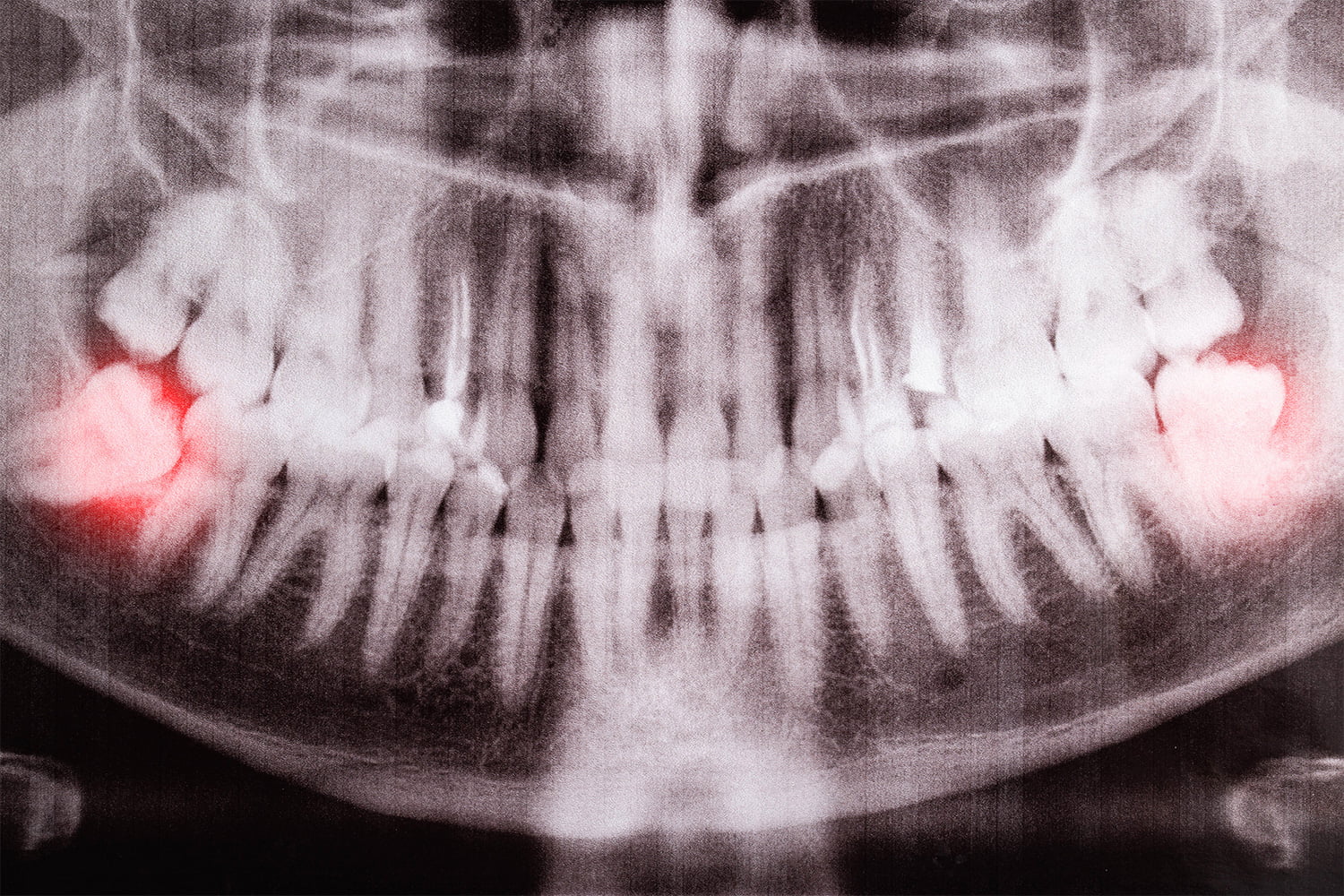Everything you Need to Know About Wisdom Teeth
15 September 2023What wisdom teeth are?
The best place to start is to address what wisdom teeth actually are. Wisdom teeth, also known as third molars, are the last teeth to grow beyond your 28 adult teeth. Normally these emerge when you are a teenager or in your early twenties. If you are experiencing tooth pain and suspect it may be your wisdom teeth, the safest course of action is always to book an appointment with ourselves to check them out. With that being said, here is everything you need to know about wisdom teeth.

Who gets them?
Most people have 4 wisdom teeth, two on the bottom and two on the top row of teeth, but not everybody’s wisdom teeth will emerge. Some people may have differing numbers of wisdom teeth emerge, it is entirely unique to you.
Why people get them removed
Because of the lack of space after you have developed your 28 adult teeth, the emergence of wisdom teeth may come at an angle, get stuck or only partially emerge. This is referred to as impacted, or partially impacted wisdom teeth. Consequently, this can cause you mild to severe tooth pain. Because of their location, wisdom teeth can be hard to clean and as such can develop dental conditions such as tooth decay which exacerbates the pain.
When/why would a dentist remove them?
A dentist would usually recommend the removal of wisdom teeth if they are causing you a significant amount of pain. Prior to this, a dentist would examine your teeth and advise if they need to be removed. Instances where this may be the case include if your wisdom teeth have decayed and risk spreading tooth decay (cavities) to the rest of your teeth. This is because wisdom teeth that have impacted or not fully broken through the surface of the gum can accumulate plaque from food and bacteria building up inside them, or tar from smoking.
Other issues which may arise from a build-up of food and bacteria could lead to:
- Gum disease
- Pericoronitis – plaque causing an infection of the soft tissue surrounding the affected teeth
- Cellulitis – a bacterial infection in the cheek tongue or throat
- Abscess – pus may build up in your wisdom teeth as a result of a bacterial infection
- Cysts – a fluid filled swelling in or around your wisdom teeth
An X-Ray may be scheduled to give a clearer view of the position of your teeth and full scope of the issue. You may find that antibiotics or antiseptic mouthwashes can resolve these issues, surgery is always a last resort.

What’s the procedure?
In the first instance, your dentist will either schedule an appointment for your wisdom teeth to be removed by themselves, or in specialist cases a surgeon for hospital treatment. You will then have the procedure explained to you and in some cases may be asked to sign a consent form. A local anaesthetic injection will be applied to numb the area around the affected tooth so you may wish to bring someone with you to drive for you if travelling via car. Your tooth will then be removed, and you may feel some discomfort from the tooth being rocked back and forth to widen the tooth socket. In some instances, a small incision into the gum is necessary and the tooth cut into smaller pieces. Your gum will then be sealed with dissolvable stitches and advise given on how long these will take to dissolve, usually between 7-10 days. Alternatively, your dentist may need to gauze over the empty socket and ask you to bite your jaws together for an hour to allow a blood clot to form.
FAQs related to wisdom teeth
Is it painful?
You may experience some discomfort, but no the procedure should not be painful. If you do feel pain during the procedure, your dentist will give you mor anaesthetic.
How long does the procedure take?
Anything from a few minutes to 20. Some cases may require longer depending on how obstinate the affected tooth is.
What aftercare should you follow?
After getting wisdom teeth removed, it’s essential to follow proper aftercare to promote healing and prevent complications. Here are some key points to consider:
- Rest: Get plenty of rest for the first 24-48 hours after the procedure.
- Pain Management: Take prescribed pain medications as directed. Use over-the-counter pain relievers like ibuprofen or acetaminophen if recommended by your dentist or oral surgeon.
- Swelling: Apply a cold pack to the swollen area for the first 24 hours. After 24 hours, switch to a warm compress to help reduce swelling.
- Diet: Stick to a soft diet for the first few days, including soups, yogurt, pudding, and mashed potatoes. Avoid hard, crunchy, or spicy foods.
- Hydration: Drink plenty of fluids but avoid using straws, as the sucking motion can dislodge blood clots.
- Oral Hygiene: Gently rinse your mouth with warm saltwater after meals to keep the surgical site clean. Also avoid vigorous rinsing for the first 24 hours.
- Avoid Smoking and Alcohol: Refrain from smoking and drinking alcohol, as they can impede healing.
- Physical Activity: Avoid strenuous physical activity for a few days to prevent bleeding.
What are the aftereffects?
You may have swelling and discomfort both in and outside of your mouth. There may be some visible mild bruising which is at its worst for the first three days but may last as long as two weeks. If you still experience bruising after this you should book an appointment with your dentist. If you do not follow after care instructions, you may also experience ‘dry socket’ which is a dull achy sensation in your gum or jaw. A bad smell or taste may also emit from the empty tooth socket. As with any surgery there can be wider complications such as a small risk of nerve damage. The tell-tale signs of this are a tingling or numb sensation in or on your tongue, lower lip, chin, teeth or gums. This can be either temporary or permanent.
If you suspect that you are experiencing pain from your wisdom teeth or are displaying any symptoms and live in the areas of Pateley Bridge or Nidderdale, contact us today or ring us on 01423 712799.
